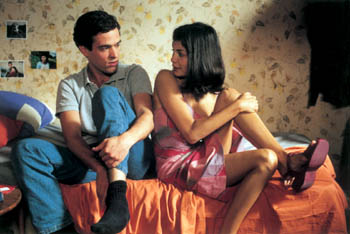![[Metroactive Movies]](/movies/gifs/movies468.gif)
[ Movies Index | Show Times | Silicon Valley | Metroactive Home | Archives ]
Euro-Pudding
The beguiling 'L'Auberge Espagnole' introduces filmgoers to the new Europe
By Richard von Busack
ON THIS ONE and only occasion, we'll use "the lazy essayist's lead." Here goes: the dictionary (Larousse's) defines l'auberge espagnole as an French idiom used in geek slang: "You get out of computers what you put into them in the first place." We'd say, "GIGO: garbage in, garbage out," but our French cousins would say, "Your computer is like a Spanish hotel--you only get out of it what you put into it." To muddy the waters further, the subtitles in Cedric Klapisch's beguiling film L'Auberge Espagnole translate the phrase as "Euro-pudding." By contrast, the publicists say l'auberge in question is slang for a "roughhouse," a place of disorderly behavior. We may never know what "a Spanish hotel" really means, but the hero of L'Auberge Espagnole tries to find out during a year's stay in Barcelona.
Twenty-four-year old Xavier (Romain Duris) goes to the city to study with the exchange-student program called Erasmus, as a way of developing his family connections to become a bureaucrat or, rather, a Eurocrat, in the new united Europe. He's taking postgrad economics courses in a language he's limited in. Arriving at the rental his mom arranged for him, he discovers that it's basically a Catalonian funeral parlor. After some effort, he wangles a coveted spot in a polyglot group household: seven roommates, five languages, one refrigerator.
While he's figuring out Barcelona, Xavier finds himself attracted to a shy and conservative married woman named Anne-Sophie (who, as a mitigating factor, owns a very expensive collection of lingerie). This illicit connection deepens despite the fact Xavier has a girlfriend (Audrey Tautou) back in Paris and also despite his sexual interest in his Belgian housemate Isabelle (Cecile De France), who is, unfortunately for him, quite a lesbian.
As in his memorable When the Cat's Away, director Klapisch shows a fine rapport with young urbanites, how they bounce off one another and prop each other up. The partying scenes are all comic and bittersweet--as in a crane shot of boys and girls in double exposure, spilling into a street at night; and an impromptu 4am hootenanny with heroic vomiting of cheap wine.
No trendpiggery or condescension mars the film, and Klapisch makes you care about Xavier without exaggerating his qualities. Xavier is a little backward, a little dogmatic, and he's not as well read as he could be. Klapisch earns the affection for him and for his likable household, especially in the end, where there's a choice passage of bedroom farce. L'Auberge Espagnole heralds the new Europe, though it's an alternative to the dreaded pan-European-financed film, with its multinational cast struggling in English, the new European Lingua Yank-a. (And yet the lone American in this movie is considered a dumbbell.) When Xavier has hallucinations of Erasmus' ghost walking, the image is well earned: here was the first great humanist, the philosopher who foresaw cultural harmony in the future. In a time of U.S. unilateralism, L'Auberge Espagnole is more than just a breath of fresh air.
[ Silicon Valley | Metroactive Home | Archives ]
![]()

Shoulder Work: Romain Duris and Audry Tautou look askance in 'L'Auberge Espagnole.'
L'Auberge Espagnole (R; 116 min.), directed and written by Cedric Klapisch, photographed by Dominique Colin and starring Romain Duris and Audrey Tautou, opens Friday at the Los Gatos Cinema.
Send a letter to the editor about this story to letters@metronews.com.
From the May 15-21, 2003 issue of Metro, Silicon Valley's Weekly Newspaper.